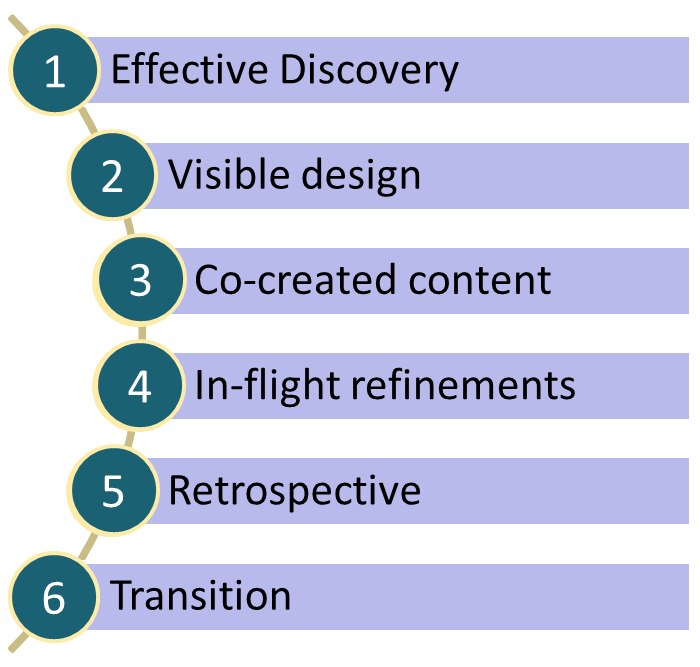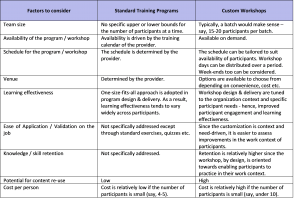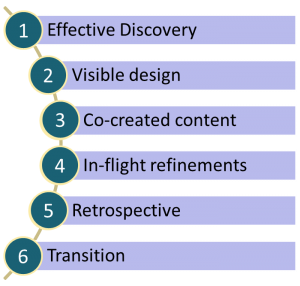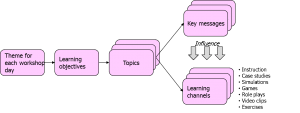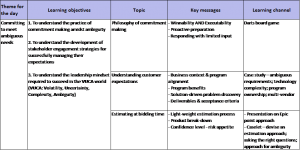As a Learning & Development (L&D) leader or Delivery Head for software, you have a constant need to upgrade the knowledge and skill levels of teams that are right in the middle of projects – a challenge akin to fuelling in mid-air! You may ask yourself, ‘Should I send the team for a training program for a few days pulling them out of their project? Or should I put them through a custom workshop that imparts them specific knowledge / skills in their work context’? To answer such questions, it will be good to understand the key differences between Standard Training Programs and Custom Workshops and the factors to keep in mind while choosing one over the other. In this context, we are assuming that both the Standard Training Programs and Custom Workshops are delivered by external service providers.
The table below summarizes the major factors to consider and the differences between the two options.
The table above should guide you on when to choose a Custom Workshop. If that is indeed the choice, it is important to structure it to align with your key objectives. In structuring the Custom Workshop, there are the six “things’ or aspects that you need to consider. The six aspects would serve as a guide in choosing the right external provider who understands how to create and deliver a custom offering that is effective.
Here are the six aspects:
We will consider each aspect in some detail.
The first step in creating a Custom Workshop is the Discovery phase with the following goals:
- Identify the requirements and profile of target participants
- Understand the customer business and the participants’ work context
- Understand the typical work challenges faced by participants
For the Discovery phase to be effective, the provider needs to adopt a multi-level approach described below.
Level 1
- Goal: To identify and validate workshop objectives and connect with the customer’s business context
- Participants: Business Unit or Delivery Heads, Head of Learning & Development, Head of Delivery Excellence/PMO etc.
Level 2
The provider should estimate upfront the time required from various stakeholders for the three-level interactions above and schedule them accordingly.
At the end of the Discovery phase, the provider should validate the following deliverables with the customer:
- Summary of findings – requirements, context and participant needs
- High level plan for topic coverage, number of workshop days and possible dates
- Approach for participant assessment and completion criteria (as agreed with the customer)
- Time estimate for additional stakeholder/participant interactions as needed for content development
- Timeline for the subsequent work in Custom workshop creation (in our experience, this can range from two to four weeks depending on the nature of customer requirements and their “uniqueness”)
The provider starts on the workshop design once the Discovery is complete. The key here is whether the provider makes the design visible to the customer on a periodic basis for feedback and validation. While various providers may follow their own ways of depicting design, our recommendation is shown in the diagram below:
The salient points in our recommended design approach are:
- A theme is identified for each day of the workshop with associated learning objectives
- A set of topics is created to achieve the learning objectives for each workshop day
- For each topic, the following are developed: coverage, key messages and how these messages are to be delivered using various learning channels: instructor-led presentations, case studies, simulations, games, role plays, video clips and other exercises
- Assessment instruments are developed as needed along with suggested solutions
In addition to the design approach, the provider should also be able to articulate the broad guiding principles for the design. Here is a sample set of design principles:
- In a typical workshop day (6.5 hours), no more than 4-5 topics should be covered
- Each topic is covered in a time slot that is about 90 minutes
- Instruction sessions are capped at 15 minutes at a stretch
- Where applicable, hard and soft aspects should be interwoven for each topic. For example, the topic ‘managing change’ would cover hard aspects like the process for change and project governance as well as soft aspects such as influencing and negotiation
- Case study – led exercises and other activities should be fully exploited – as much as 50% to 70% of the workshop day depending on the topics and key messages
- Participant engagement should be sustained throughout – for example, through use of multiple learning channels
An example design segment is shown below.
The provider typically creates custom content for the workshop overlapping with the design. Co-creation of content by the provider and customer representatives is highly desirable rather than leaving it entirely to the provider to address, for a couple of reasons;
- Firstly, there is an obvious need to ensure that the custom flavor permeates ALL aspects of content and eventual delivery during the workshop; co-creation is crucial to achieve this effect
- Secondly, with active participation of potential participants in content creation, there is a significant enhancement of their ownership in making the Custom Workshop successful
We believe that a major target of such co-creation is the development of case studies specific to the customer context and participant needs. The “seeds” for these case studies come from Level 3 of the Discovery phase when the provider gathers information on project experiences from a sample of participants. The provider needs to ensure that the case studies are well-integrated with the rest of the content and deliver the intended key messages.
The provider should also be able to augment the co-created content with other pre-existing content that is suitable for use as-is – such as self-paced learning, curated videos, white papers and so on. Some of this content may be used as pre-requisites for classroom sessions enabling participants to derive greater value from the face-to-face interaction in the class.
This is when the rubber meets the road, as they say! When the workshop is being delivered, the provider should be able to make minor adjustments in coverage & delivery based on feedback from the class. Most providers would display such responsiveness to participants – in Standard Training programs as well.
However, In the case of Custom Workshops, the provider needs to go a step further by
- Actively seeking formal feedback at the end of every workshop day
- Factoring such feedback for possible improvements in the remaining days of the workshop
- Keeping customer stakeholders abreast of planned improvements planned and seeking views/feedback as needed
Such refinements are very valuable especially when workshop days are spread over a period and there is time available between them to make improvements.
This is at the very least, the classic training feedback form to be filled out by participants. For Custom Workshops, there are additional agenda items in the Retrospective. The provider should
- Analyze and present a summary of participant feedback to the customer sponsor and other stakeholders
- Seek additional feedback from the customer leadership based on what they have heard from their own internal channels
- Provide a consolidated assessment of the workshop and its effectiveness in meeting objectives based on the above
When the provider is charged with delivering several editions of the workshop, the Retrospective at the end of each edition is a must for continuous improvement and improved value to the customer.
A Custom Workshop is often a significant investment for the customer in terms of time and effort. Hence, in many cases, customers would want to be able to re-use the content multiple times within their organization. In such cases, the Transition aspect assumes importance.
To support this Transition, the provider must be able to
- Conduct train-the-trainer sessions as needed
- Enter into appropriate licensing agreements for continued use of content by the customer
- Provide future content upgrades to content as needed & agreed
So, there you have it all, the six things to look for in Custom Workshops and potential providers.
Needless to say, you could add other traditional aspects such as provider track record and credentials of trainers while making the final choice.
At PM Power Consulting (PM Power), we have successfully designed and delivered Custom Workshops in a number of areas since 2006 – areas such as Agile Transformations, DevOps, Project, Program and Delivery management. Coupled with on-the-job coaching over an extended period, these workshops have enabled tangible improvements in the work performance of hundreds of participants.
For more information, please reach us at info@pm-powerconsulting.com.
About the author:
ShivK, is Principal Consultant and founder-member at PM Power Consulting (PM Power) and has over 30 years of experience in the software services industry in India and abroad. As part of PM Power since 2006, he has been involved in many offerings for competency development of Project, Program and Delivery Managers – almost all of them comprising Custom Workshops. Over the years, ShivK has assisted hundreds of managers as a performance coach, blending contextual coaching with Custom Workshops. ShivK holds a Bachelor’s Degree in Electrical Engineering from IIT, Madras and a Masters in Industrial Management also from IIT, Madras. He is an avid reader, lover of physical books and a born foodie!

